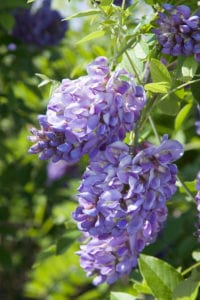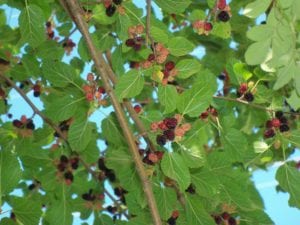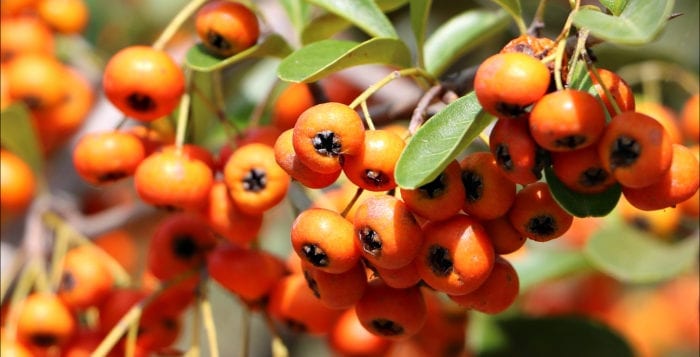By Ellen Barcel
Last week we took a look at a number of trees that you may consider adding to your garden, and how important it is to do research, to make sure that the trees’ qualities match your preferences and requirements. This week, let’s take a look at some perennials and shrubs.
Perennials and shrubs
Deer love hostas (as well as many other plants). Hostas in general don’t do well in sunlight. You may be willing to spend a lot of time watering them and putting up with the crispy edges most develop in strong sunlight. Personally, I just put hostas in the shade in the back yard, away from deer.
One of the biggest mistakes I frequently see is planting rhododendrons in front of windows. That two-foot-tall baby plant, may grow up to 10 or 12 feet tall totally covering the windows. Always check out the variety and its mature size when selecting it, unless, that is, you have a nasty view from a window and wish to block it out.

Oriental varieties of wisteria are very aggressive. Unless you are willing to tame this beautiful but aggressive plant, avoid it. It climbs up nearby trees, spreads along the ground and roots easily. If, however, you wish to cover a gazebo and are willing to take the time to keep it pruned back, it makes a beautiful privacy screen.
Most, but not all, varieties of holly need a male plant in the area so that the female plants will produce those beautiful red berries. If you buy holly, make sure you have the male plant as well. It will generally be smaller than the female and will not produce red berries itself. So plant it where it can pollinate the female plants but not where you expect a beautiful display.
Firethorn (Pyracantha) is a woody shrub that produces lovely flowers in spring and gorgeous clusters of yellow or orange berries in fall. The tall shrub (six to 16 feet) makes a lovely specimen plant or as part of a hedge. The evergreen plant is hardy in zones 6 to 9 (Long Island is zone 7). However, as its name implies, it’s filled with thorns. So, grow this beautiful and relatively carefree shrub knowing that the thorns can get you.
Devil’s walking stick (Aralia spinosa) is native to North America. So it can be found growing wild but not usually on Long Island. Some people like the unique plant (or small tree) with its white flowers in spring, which are followed by purple-black berries, and go out of their way to plant it. However, its name should make your aware of its nasty qualities, namely the horrible thorns along its stems. If you must add this to your garden, plant it in a remote area where no one can come in contact with those spines. Or, better yet, don’t plant it at all.
Research
With such easy access to information on the internet, no one should be making these, and other, gardening mistakes. Go to your search engine, type in the name of the plant in question together with a phrase such as “negative qualities” or “pros and cons.” Then check out the information and find out if you’re willing to live with the negatives. It may be worth it.

You may be willing to put up with the spiky seed pods of the sweet gum, or the long string beans of the catalpa, or the fruit dropping from a mulberry tree. You may like the fact that certain plants are slow growing and won’t take over your garden. Or you may want a fast growing plant to block out undesirable sights quickly. Make sure you know the final size (height and width) of a tree. Don’t plant a tree that easily spreads to 40 feet across right up against your house. Both the tree and the house will suffer.
Note that websites with extensions like .edu (colleges, universities, etc.) and .org (organizations) are most likely to give accurate, well-researched information. So, do your homework before you hit the nurseries. Then, ask them for their opinions. They may know, for example, that local deer love the buds of Montauk daisies, despite the fact that most websites say the plant is deer resistant.
Ellen Barcel is a freelance writer and master gardener. To reach Cornell Cooperative Extension of Suffolk County and its Master Gardener program, call 631-727-7850.





